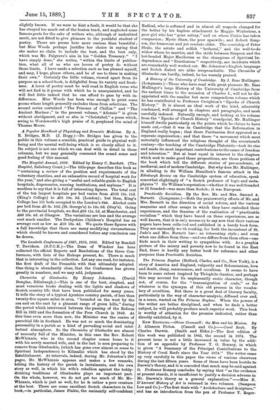A History of the University of Cambridge. By J. Baas
bfullinger. (Longmans.)—Those who have read with great pleasure Mr. Bass Mullinger's large History of the University of Cambridge from the earliest times to the accession of Charles I., will not be dis- appointed with the smaller but more compendious volume which he has contributed to Professor Creighton's "Epochs of Church History." It is almost an ideal work of the kind, admirably condensed, well arranged in chapters and paragraphs, and most carefully indexed. Naturally enough, and looking at his volume from the "Epochs of Church History" standpoint, Mr. Malinger himself dwells particularly on the points which he claims to have made out,—that it was in Cambridge that the Reformation in England really began ; that there Puritanism first appeared as a separate organisation ; and that there "a movement which most materially influenced the religious thought of the seventeenth century—the teaching of the Cambridge Platonists—took its rise and made its most important contributions to the cause of freedom and toleration." But at least equal in interest to the chapters which seek to make good these propositions, are those portions of the book which tell the different stories of pre-academie, of medireval, and of modern Cambridge. But why does Mr. Mullinger, in alluding to Sir William Hamilton's famous attack in the Edinburgh Review on the Cambridge system of education, speak somewhat slightingly of "a Scotch professor of logic and mete.- physics"? Sir William's reputation—whether it was well founded or ill founded—was more than Scotch ; it was European.


































 Previous page
Previous page